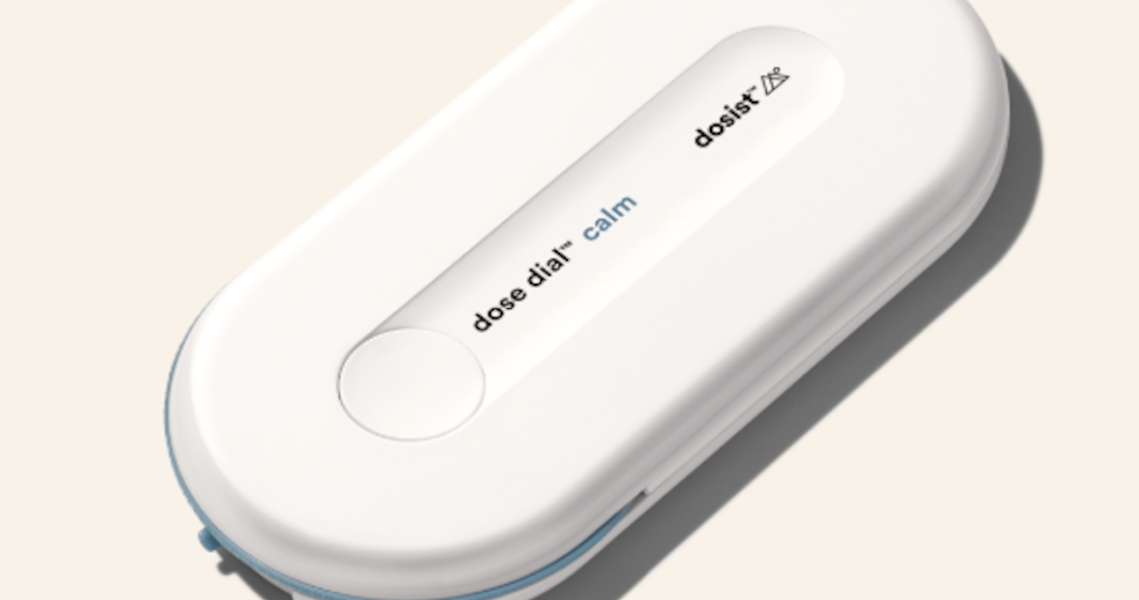Dosist, known for its signature dose-controlled vape pen pegged to moods, has debuted the Dose Dial, a measured delivery device for edibles. Each Dose Dial holds between 10 milligrams and 100 milligrams of THC depending on formula, such as relaxation or uplifting benefits, and offer individual doses of THC via 3.7-milligram tablets.
Additionally, Dosist will launch in Nevada this week through 10 distribution partners, and will hit 15 more stores by the end of 2019. The company’s last market expansion was to Florida, which is only a medical marijuana marketplace, in December 2018. Prior, it sold exclusively in California.
“We waited two years before we entered Florida, because we had to refine our processes of growing [the business],” said Gunner Winston, CEO of Dosist. When Winston came on board as CEO in 2017, Dosist was in 250 locations in California and on track to scale to 500 stores in the state. Today, Dosist is carried in 100 locations in California and just over 30 in Florida.
“If you want more revenue, you open more accounts, but if you want a base relationship with the consumer, you curate the accounts you are in,” said Winston.
Dosist has been in the midst of an infrastructure reorganization throughout 2019 and saw year-on-year growth of about 50%. With the addition of its new edible product and expansion into Nevada, as well as Arizona (medical only), Colorado and Michigan by the end of the year, Dosist is expecting 300% growth in 2020. It also plans to open in Canada and New York in the first quarter of 2020. Dosist would not disclose yearly sales figures.
Dosist’s push is in line with customers’ appetite: global consumer spending on cannabis is expected to hit $32 billion by 2022, per BDS and Arcview Market Research.
Beyond expanded distribution, Dosist’s entrance into edibles is surprising given that the segment is led by confectionary items like chocolates sold by MedMen. Lord Jones, though CBD-only, also sells an assortment of gummies.
“If you walk into any dispensary or cannabis retail shop, edibles are presented as young and infantile in look and feel. This is precarious,” said Anne-Marie Dacyshyn, Dosist chief marketing officer.
Because less of the consumer conversation has revolved around THC, Dose Dials come with a set of instructions on how to use the product, such as on an empty stomach for consumers. Meanwhile, retailer partners are supplied with 30-page pamphlets to educate sales associates.
Category crossover is a natural lever any company could use for increased revenue opportunities; last week, CBD brand Plant People moved from ingestibles into skin care, just as Beboe did in March. For Plant People’s part, it is promoting a lesser-known cannabidiol, cannabichromene in its topical products, said Gabe Kennedy, Plant People co-founder.
But the road to THC is a trickier one, as the ingredient cannot cross state lines and must be cultivated and grown in the state where it is sold.
“We’ve had to control and set up the manufacturing, sales, marketing and find talent in all of these states. That is laborious, but it’s the only way to ensure that THC is associated with wellness,” said Winston. Cannabis company Green Growth Brands is in the midst of similar exercises for its Camp brand.
But more product is coming for Dosist, said Winston. The company will be unveiling an unannounced cannabis product without THC in the first half of 2020.




